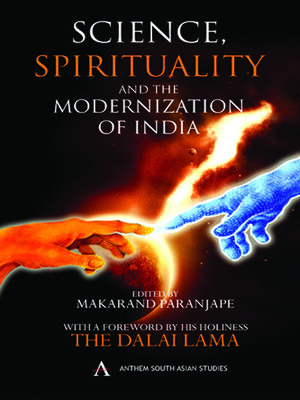Science, Spirituality and the Modernization of India
ebook ∣ Anthem South Asian Studies
By Makarand R. Paranjape

Sign up to save your library
With an OverDrive account, you can save your favorite libraries for at-a-glance information about availability. Find out more about OverDrive accounts.
Find this title in Libby, the library reading app by OverDrive.



Search for a digital library with this title
Title found at these libraries:
| Library Name | Distance |
|---|---|
| Loading... |
Spirituality played a key role in the construction of Indian modernity. While science has certainly been an agent of modernization in India and other non-Western countries, what makes Indian modernity somewhat special is that spiritual leaders have also been instrumental in the process. Moreover, leading Indian scientists and spiritualists have recognized the immense potential for dialogue between the two disciplines. Post-colonial India, with its ready access to a holistic spirituality and significant achievements in science and technology, is a fertile site for such a dialogue.
Each of the book's four sections addresses specific themes: (1) The tension not just between science and spirituality, but also between the East and West; (2) how some key figures in India became carriers of modern consciousness, and explored the relationship between science and spirituality in the very process of trying to reform their society; (3) significant areas of research in which science and spirituality are both deeply implicated; and (4) the relationship of both scientific and spiritual practice with gender and social justice.
|Spirituality played a key role in the construction of Indian modernity. While science has certainly been an agent of modernization in India and other non-Western countries, what makes Indian modernity somewhat special is that spiritual leaders have also been instrumental in the process. Moreover, leading Indian scientists and spiritualists have recognized the immense potential for dialogue between the two disciplines. Post-colonial India, with its ready access to a holistic spirituality and significant achievements in science and technology, is a fertile site for such a dialogue.
Each of the book's four sections addresses specific themes: (1) The tension not just between science and spirituality, but also between the East and West; (2) how some key figures in India became carriers of modern consciousness, and explored the relationship between science and spirituality in the very process of trying to reform their society; (3) significant areas of research in which science and spirituality are both deeply implicated; and (4) the relationship of both scientific and spiritual practice with gender and social justice.







